#victory over aids flag
Explore tagged Tumblr posts
Text


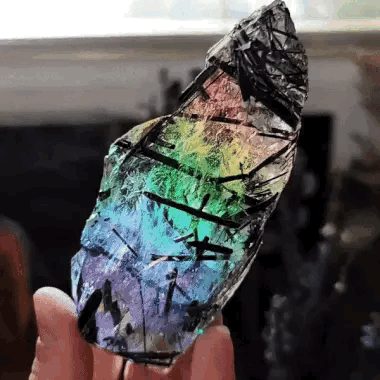






Victory over AIDS LGBT flag 🖤
“The flag was reportedly suggested by a San Francisco organisation, and Sergeant Leonard Phillip Matlovich – a Vietnam War veteran – suggested that the black stripe be removed, and all surviving flags featuring the black stripe burnt, once a cure for AIDS had been discovered.”
x / x / x / x / x / x / x / x
#stim#sensory#rainbow#black#lgbt#victory over aids flag#food#cake#sparkly#slime#hands#soap#slicing#crystal#nails#glitter#chunky glitter#heart#clay#clay cracking#moon#shiny#long nails
63 notes
·
View notes
Text
Neighbors with Benefits: Chapter 14 (Joel x reader)
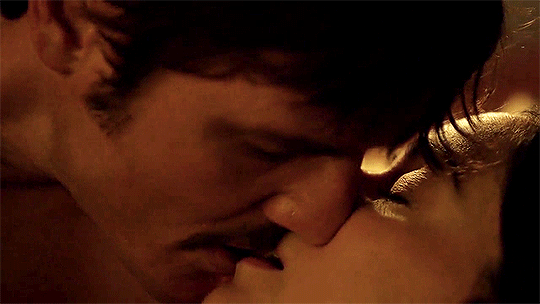
Joel Miller x f!reader
Word Count: 2000
Your mother was busy getting all the side dishes ready for the picnic while your dad packed coolers of beer, soda and water outside and prepped the grill.
“I'll bring these out,” you offered, repeating what felt like a thousand times, “What else do you need?”
You knew your mother had a thousand things to say, and maybe a hundred questions after that. Still, she remained cordial and attempted to seem normal on the surface. You knew by her tightly wound mannerisms that she wasn't even close to portraying that - at least not to you. She might've fooled a coliseum full of people with her mask, but not you.
When everything was set up and less than an hour remained until guests began to arrive, you tried to excuse yourself.
“Okay, I’m going to shower.” You scampered toward the stairs but your mother called you back.
Fuck. You had almost gotten up the stairs, but without stalling made your way back to where your mom stood in the kitchen.
“Do you need any more help?” You tried to butter her up a bit by offering your aid and pressing on a smile, but your mother wasn't having it.
“You need to consider what you're doing, (Y/N),” she warned, “I'm saying it for your own good.”
“Okay,” you halfheartedly agreed.
“I mean it,” your mother went on. “I honestly don't know what other advice to give you. He’s a man. He's married.”
“He's not with Cecille,” you insisted, “Do you really think I'd get involved with a married man? I mean, I guess legally he is but they haven't lived together for awhile and they're getting a legal divorce.”
“You're twenty-three.”
“And I'm able to date who I want to date,” you said without trying to sound confrontational. “Mom, I know on the surface this looks bad. But I'm going to feel this out and see where it goes. If I get my heart broken, it's on me. I have feelings for Joel and he has feelings for me. I’ll deal with the consequences, whatever they might be.”
She stared at you for a long moment before saying quietly. “Okay.” Her white flag was waving and, if nothing else, she was done fighting you on it - for the moment.
A temporary victory. You knew this meant your mother wasn't going to tell your father; not yet. And so you silently thanked her with a closed-mouth smile and took the stairs to take a shower.
***
The picnic had dragged. You checked your phone again and again and again. Joel, you guessed, was refraining from being the one to initiate conversation. You couldn't blame him, and you hoped that was all it was - him being cautious.
What if it's over? You wondered. What if that's it? What if all this scared him off?
Your anxiety got the best of you and you wandered around the side of your house to text him. Your thumbs danced on the screen as you asked how his day was going, if he got in touch with Tommy and if later was still good to meet up.
You chewed on your thumbnail and rounded back into the picnic. It was much to your relief that Cecille hadn't shown up. As the hours ticked by you grew more hopeful that she wouldn't swing by. Still, seeing her car in the driveway next door made your insides twist with a concoction of feelings.
Ding! Your phone sounded off and your head was pulled down like a magnet toward the screen.
Text me a time, Joel texted back to you, remember how to get to the fishing spot?
You typed back without hesitation: Yes. I'll let you know when I'm done here.
All you wanted was to be back with. You wanted to take in his body language, hear his words. You wanted to know that despite what had happened that morning, that everything was alright.
You glanced around the backyard at the scene you would have typically enjoyed. There was a four on four volleyball game going on, two people were playing cornhole, others were talking and laughing around the tables you'd helped your parents set up. Regardless of the smiles, the music, the laughter and the sun shining down on everyone, your smiles were forced and fake.
By the time the last of the guests were waving goodbye, you couldn't wait any longer.
Seven o'clock? You typed to Joel, while helping your parents clean up.
You folded a table in half and began lugging it toward the open bay of the garage. When your phone pinged, you set the table down on the driveway so you could check it.
I'm addicted, you acknowledged. Fuck.
Being head over heels for someone was more than you bargained for. You truly felt addicted to Joel Miller.
I'll be waiting, Joel wrote back.
His words out more pep in your step, and you hurried to lug in the cornhole boards and a second table. Inside, you helped your mother wrap up some of the leftovers and wipe down the countertops before finally hurrying to retrieve your keys and a backpack you prepared.
“Are you going to be home tonight?” Your mother asked. She held your gaze and you shook your head.
“I don't think so “ you told her honestly, “But I'll let you know for sure.” She added, “Is that alright?”
“Like you said, you're twenty-three.” She shrugged. “You can do whatever you want.” Your mother turned toward the sink. “Be careful. And text me.”
“I love you.”
She turned and met your gaze. Despite her outward, quiet concern for the situation she said honestly. “I love you, too.”
On a completely opposite and oblivious note, your father high-fived you by the front door as he entered after putting some things in the garage.
“See ya later, kiddo!”
You smiled to yourself, relieved by his nonchalant demeanor. “See ya later, Dad. Love ya.”
“I love you, too.”
You were out the door a few seconds later, speeding off into the night to meet Joel at your secret location. You needed to see him in the worst way. Despite his agreement to meet, there was doubt that plagued the back of your mind.
What if, what if, what if…
Your foot hit the gas a little harder as you drove from back road to back road until the park came into view. You had to really think to remember a few of the last bends in the road but soon you recognized the wooded area that led down to the lake.
Where is he? Where is he?
Relief filled your core when you saw Joel’s truck in a small clearing. Your stomach filled with butterflies as you pulled up beside him. Joel turned from where he sat in the driver’s seat and he flung his door open almost immediately.
Oh, no, you thought. He has something to say.
Joel looked like a man on a mission. You prepared yourself for the worst. You prepared yourself for the heartache. The other shoe was about to drop. All of a sudden you were scared to get out of the car. Joel's face was too serious. If you just sat there then you wouldn't have to hear his let down.
Stop! You scolded yourself.
You popped open your door and let yourself as Joel rounded the front of your car.
Fuck, he looks good.
Joel was all you thought all about all day - not that that was anything new. He stared at you down with jeans a snug fitting white t-shirt. It hugged his rugged upper in all the right places and your former anxious thoughts were replaced far different ones.
“Hi,” you said to him, folding your hands in front of you.
Joel didn't immediately say anything. He appeared as if he was studying you. You were sure he was far better at it than you were.
He walked the rest of the way to you and you went to speak again.
“Joel, I-” You were cut off when he grabbed your face and kissed you firmly on the lips. You kissed him back, letting your guard down completely in his embrace. Almost immediately it grew heated. Your hands began to wander. He began to snake your shirt up over your head and before you knew it you were nearly naked in the bed of his truck with his body blanketing yours.
“Joel,” you finally choked out, “I want you.”
“I love you,” he voiced in a gruff whisper against your lips before devouring them once more.
“I love you,” you whimpered back. One of your legs hooked around his naked waist and Joel groaned into your mouth.
Everything about the moment was feral and raw and right. Being apart all day amidst the uncertainty and the angst made you needy for one another. As bad as you wanted Joel, you wondered if he wanted you more. It felt impossible, but the way he approached you that evening without even saying a word left you breathless.
Darkness had fully taken over the world when the two of you finished. Even long after your lovemaking was through, your lips touched, your hands explored one another and Joel kissed along your collarbone, neck and shoulders.
Being out in nature completely nude and basking in the afterglow of perhaps the most tender, emotional sex you had ever had was an experience you wouldn't soon forget.
“I was afraid you were going to break things off with me,” you said quietly, kissing Joel’s neck as he closed his eyes beside you.
“I could never do that.”
“Never?” You let your teeth graze his neck as you continued to kiss him there.
“Mmm..” Joel moaned out loud, “Never.”
Laying face-to-face you linked your arm up under his and rested your palm on his shoulder blade. You pulled him close and kissed him. There was no getting enough of Joel. You slipped your tongue past his lips and he eagerly reciprocated. As you made out you felt him harden again against your upper thigh.
“I want you again,” you practically begged, pulling him closer. “Please.” Your hand drifted down to his lower back and Joel rolled his body back on top of yours with your encouragement.
His kiss was smoldering. You pawed your arms around him and tangled a hand in his thick, dark hair. When Joel’s lips parted from yours he kissed down your neck to the tops of your breasts before separating himself from you.
“No,” you begged, pulling him back with a smile as your teeth caught your bottom lip.
Joel satisfied you with a sloppy, closed-mouth kiss. “I'm just reaching inside for some blankets,” he explained, whispering against your lips. Joel pried open the back window on his truck and grabbed a small stack of blankets from the back seat.
You adjusted so he could place a few down on the truck bed and then laid back down flat and pulled him back to you.
Your bodies connected immediately as his lips crashed back against yours. When your lips finally parted to take a breath, you gasped out the words, “Don't leave me.”
Why was this such a problem for you? Even Joel, himself, saying he would never leave wasn't convincing enough. You were too deep into it emotionally and it was making you a wreck inside.
Joel, patient as ever, brought his lips to your ear. “You're mine.” His teeth latched onto your ear lobe and he swirled his tongue around the area. “All mine.”
Your head dropped back in pleasure and you dug your fingers into his back.
New kink unlocked.
CLICK HERE FOR NEXT CHAPTER
@mellymbee @pedropascal111 @axshadows @mybritishstyle @untamedheart81 @amyispxnk @goodvibesonly421 @cosmic006533-blog @ashleyfilm @maybetomorrowgirl @rebeccawinters @cuteanimalmama @vickie5446 @writlingerz @drewharrisonwriter @churchofjoemiller
#pedro pascal#joel miller#joel miller fanfiction#joel miller x you#joel miller x f!reader#joel miller x y/n#pedro pascal x you#joel miller x reader#pedro pascal x y/n#joel miller x oc#pedro pascal x ofc#protective joel#joel x oc#joel miller fanfic#joel miller x f!oc#pedro pascal x oc#pedro pascal x reader#pedro pascal x f! reader#joel miller x female oc#joel miller fic#joel miller x female reader#pedro x you#pedro pascal x f!reader#joel miller the last of us#joel miller x original character#joel miller gif#joel miller x fem reader#pedro pascal x female reader#joel x female reader#pedro pascal x fem reader
194 notes
·
View notes
Text
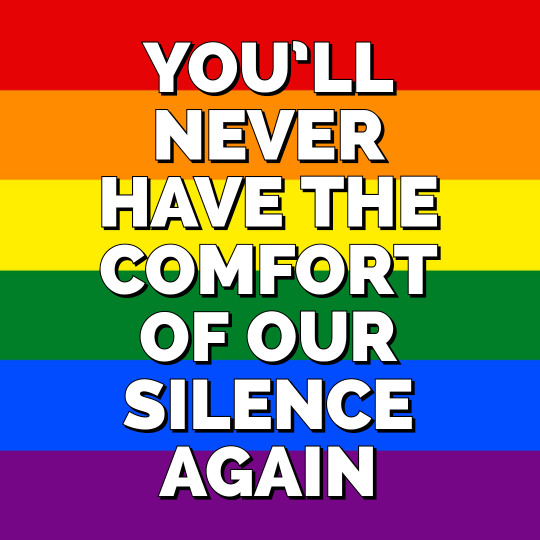
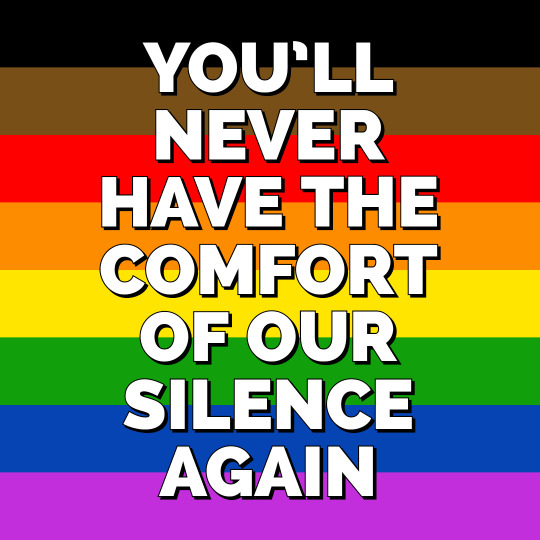
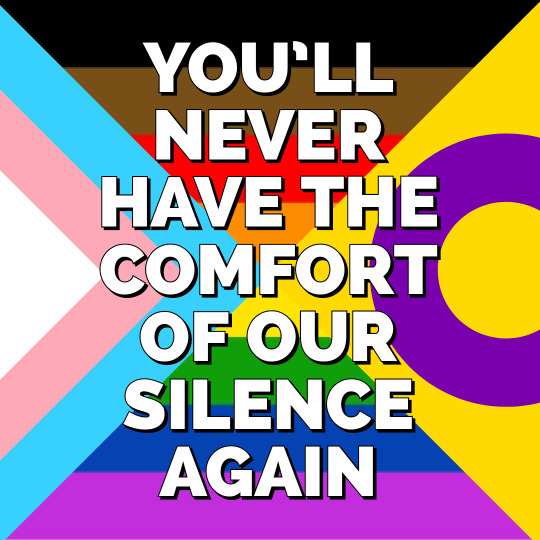


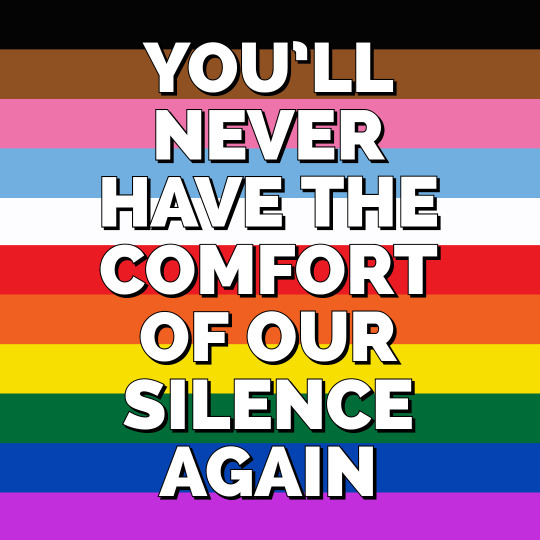
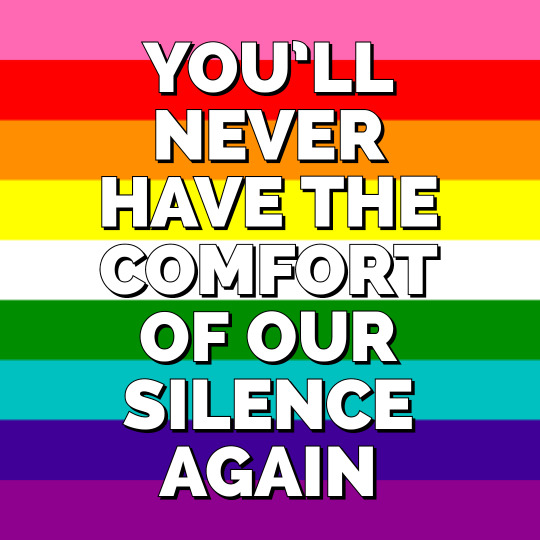
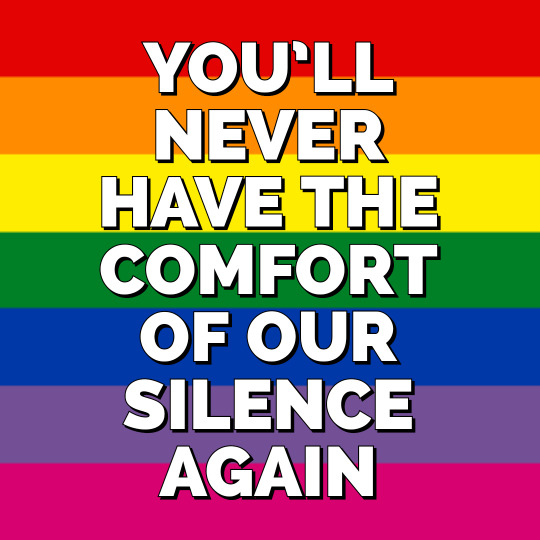

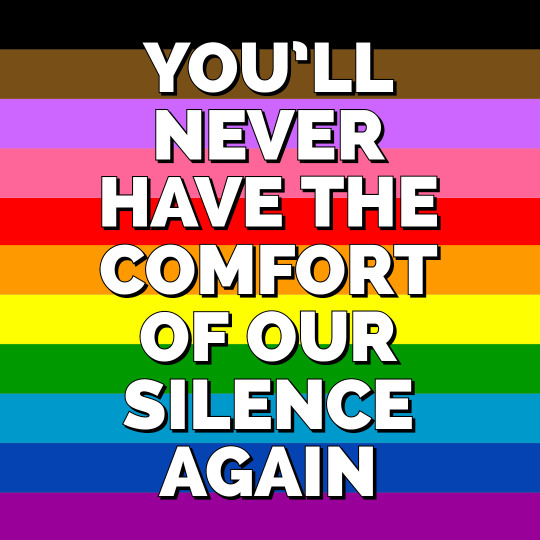
Because we always need more rainbows.
(Image description: ten square pride flags with white text that reads "you'll never have the comfort of our silence again".)
These are inspired by an image of a sign taken at an anti-Anita Bryant protest in 1978.
Flags:
Six stripe rainbow
Philadelphia pride flag
Indivisibility pride flag
Victory Over AIDS flag
Progress pride flag
Philadelphia pride flag with added trans pride stripes
9 stripe Love Fest Festival pride flag
Rainbow/bisexual flag combination
Gilbert Baker's 2017 9 stripe Diversity flag
Baker's Diversity flag with added black and brown stripes
2K notes
·
View notes
Text
Theory: Sauron Did Not Kill Galadriel's Brother in the Rings of Power
In my quest to exonerate the Dark Lord Sauron of all his accusations of wrong doing I wanted to present a little theory I've been thinking about. (Has anyone shared this before? Please let me know in the replies).
The premise given to us in Rings of Power Season 1 in Galadriel's opening prologue is that after Morgoth was defeated (in the The War of Wrath) that Sauron bade any who would follow to the North.

Finrod, Galadriel's eldest brother and king of Nargothrond who canonically was killed honoring an oath to aid Beren in his quest to recover a Silmaril for Luthien's father before the War of Wrath, went on a mission to seek out Sauron and bring him to justice dead or alive presumably. Finrod was killed and Galadriel found his corpse which was desecrated with the strange markings.

This sent Galadriel on a quest for vengeance for hundreds of years looking for the Orcs who killed her brother and she believed still served Sauron.

She finds the same symbol on the anvil in the dark fortress in the Forodwaith where Sauron had ruled before being assassinated by Adar and the Uruks. Later she learns was a symbolic map of Mordor in the event of Morgoth's defeat.

In Season 1 the Uruks under Adar's leadership invade the Southlands and enact the secret fallback plan to create Mordor which Sauron in disguise even tries to prevent.
So what about the theory?
Galadriel says Finrod was killed by Sauron. She believes it.
Galadriel also believes the symbol is Sauron's symbol.
Galadriel believes that Sauron plans to return to power through the plan she learned about and that his goals are to take over Middle Earth or at least pose a threat to her people's kingdom when he does.
What if she were wrong as so many of her Elven peers believed?
Sauron never used or uses the symbol for himself
We never saw Sauron using the symbol of Mordor for himself. After the defeat of Morgoth he does not encourage the Uruks to go to the Southlands, he literally takes them in the opposite direction, to the North. As the symbol is a creation of RoP and set in the second age, it also tracks that Sauron adopts the "Eye of Sauron" symbol for himself.
Adar on the other hand, does use the symbol that was conveniently carved on Finrod's corpse. He uses it as a flag!
Sauron Didn't Enact The Successor Plan
As far as we know from Season 1 and 2, Sauron went directly North, did not pass Go and did not collect $200. He bade all others follow him there where he seemed to work on his experiments of Power over flesh.
If he had killed Finrod in or around the time of the War of Wrath. Why carve a message into Finrod's body that would tell his enemies where they were going?
Were the Uruks possibly already planning the move to the Southlands per the plan when Sauron forced them to the North instead? Hence why they were so eager to rebel against him for Adar?
When we meet Sauron in season 2 he appears to be attempting to find Adar and the Uruks, perhaps to get his own vengeance, but meeting some men along the road they easily persuade him to try to seek Numenor instead. He could care less it seemed if the Southlands did burn or not at this point.
When he had a chance to stop the eruption of Mt. Doom and to fight the Uruks and Adar. He took it eventually and tried his best to prevent it, seemingly. Talk about the 4th Dimensional Chess all you want but he wasn't acting in collaboration with Adar at this point, nor did it particularly help his cause to let Adar have this "victory".
Sauron doesn't carve messages into people's bodies
At least so far... but Adar does in Season 2 before the siege the Elvish soldiers find one of their men mutilated with a message for Sauron "Where is He". That seems to be Adar and Uruks calling card.

Again there is no reason for Sauron to carve the symbol of Mordor into Finrod. Especially if that was pre-War of Wrath: Beren & Luthien timeframe. If ROP has a different timeframe for Finrod's death which comes after the War of Wrath, it's not clear that Finrod even was killed before or after Sauron was overthrown by his own soldiers.
There's also the bit where Adar and the Orcs are branding the Southlanders with the symbol of Mordor. They don't view it as Sauron's symbol but claim it for themselves.
Sauron never admits he did it

Well why would he? It's a fair question. He did come clean with various other aspects of what he did to Galadriel. In the forge when he says "I'm sorry. For your brother. For all of it." He doesn't say he is sorry for what HE did to her brother, just for his own part in the overall war and the fact that he worked side by side with that enemy in the darkness for so long.
In the canon story, Sauron definitely orders Finrod's death. Again in ROP this might not be how it happened. If the timeline is:
Morgoth defeated
Sauron goes to Forodwaith with the Uruks
Finrod goes to hunt Sauron
Sauron is turned into the goop monster by Adar
Somewhere the Finrod comes upon Adar and the Uruks in the wild lands as they journey to the South and kill him. Carve up his remains as a message to other Orcs making that journey to their new home
Galadriel finds the corpose of her missing brother and takes up his quest for vengence, assuming that it was Sauron's doing not Adar's
In this timeline, Sauron has an alibi!
Sauron knows Adar did it and yet he is taking the blame
This might give further meaning to the exchange between Halbrand and Adar in S1E6 where he pins Adar down.
Adar says "did I cause someone you love pain?"
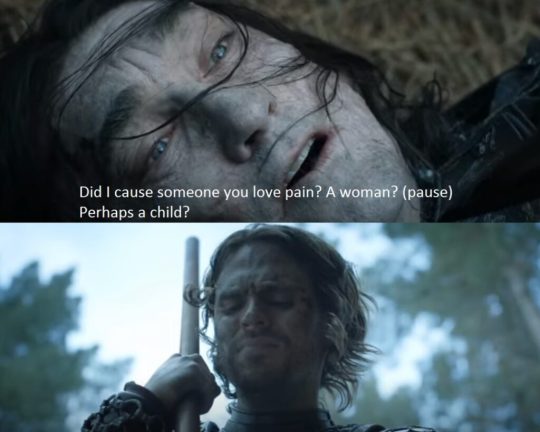
Sauron winces and barely contains his rage. What if Sauron KNOWS it was Adar who killed Finrod and how much that pain has brought to Galadriel? But he cannot tell Galadriel the real truth without revealing himself at this moment. As we all know now, Sauron loves Galadriel, so Adar's words perfectly reflect what Sauron is feeling.
"You don't know what he did!" Sauron barks at her when she tells him to stop.
It makes so much more sense.
Does it excuse Sauron for pretending to be Finrod when he invades Galadriel's mind in S1E8... eh.. not really, but it does change the context to be slightly less creepy I suppose?
#its not saurons mark its adars#finrod#sauron did nothing wrong#haladriel theory#haladriel#galadriel#sauron#the rings of power#rop theory#rop meta
84 notes
·
View notes
Text
STRETCH GOAL UPDATE #11
WE DID IT! We reached our all of our stretch gals, and now this McGucket standee designed by PossumBreath on YouTube could be yours for Tiers 4+! We have been beyond grateful and amazed by all of your support for this project; and there is still six more days to get yourself a Mystery Twin Mystery Bag.
Shop | Kofi All proceeds go to aid for Gaza. Preorders close January 15th!
How Do Stretch Goals work in a “Mystery” Bag? Stretch goals add items to the Mystery Bag item pool!
In the case of stretch goal pins, charms, or stickers, reaching this goal means the ones in your bag might be upgraded to a specialty charm/pin or a holo sticker!
In the case of other stretch goals, like notebooks and fake tattoos, these will be added to all boxes above a designated tier!
The only bag tier where you are guaranteed to get all items, including stretch goal items, is Tier 5!
Stan & Ford Chibi Art by @starryemeralds
Image Description: an animated video with various graphics while the Gravity Falls Theme song plays.
Image 1: The background is a painted background of the forest in Gravity Falls. In light yellow words is, "STRETCH GOAL #11 UNLOCKED!" that bounces.
The image slides to the next.
Image 2: In front of the same background now has a trail, labeled "STRETCH GOAL CHASE!" On on end is a chili angry Ford; at the other end is Stan running with the Mystery Bag -- a navy blue pouch with Dipper and Mabel's zodiac symbols in the Palestinian flag colors. Spread out across the trail are various silhouetted items with a yellow question mark over them. Ford runs from the tenth to the eleventh, which then enlarges to the center of the screen.
The image slides to the next.
Image 3: A graphic designed to look like a page from Journal 3 with coffee stains, ink splatters, and symbols. On a taped slip of paper in the top right corner reads: "350 ORDERS STANDEE" Below are is a standee of McGucket. Side 1 of a young McGucket sitting and playing with a Rubik's cube; the other side is of McGucket in a Society of the Blind Eye robe and holding the memory gun.
Image 4: The forest background returns, now with the "How Do Stretch Goals Work in a “Mystery” Bag?" message from above.
The image slides to the next.
Image 5: Chibi art of a victorious Ford holding the Mystery Twin Mystery Bag while Chibi Stan stands annoyed behind him. Above them reads "ALL STRETCH GOALS REACHED!!" And then below, "Thank you for your support"
#gravity falls#gaza relief#mystery twin mystery bag#palestine#gaza aid#mtmb#gaza fundraisers#stanley pines#stanford pines#stretch goals
69 notes
·
View notes
Text
✊ ✿ ♣︎ pick a card ♣︎ ✿ ✊
Messages for You this Inauguration Day (USA)
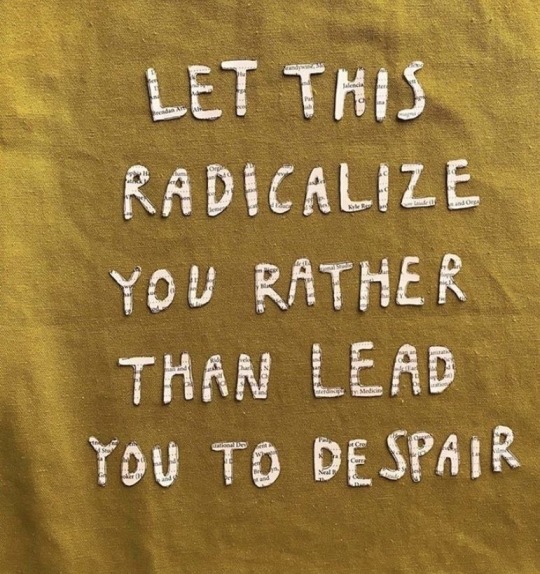
₊˚ʚᗢ₊˚✧゚how to pick // for entertainment purposes only, and other disclaimers ✧˚ ༘ ⋆。♡˚
It’s Inauguration Day in the USA, and we’re scared for the years of suffering to come. I made a spread to see how you can overcome fear and organize to create a better world. We’re stronger together. ❤️
spread: Glenda's Guidance // decks: Motherpeace, Nature Meditations by Kenya Jackson-Saulters



Pile 1 → Pile 2 → Pile 3
Inhale & exhale 3x, now pick!

★ free readings ★ support me ★ other pac's ★
★ check out this reading! → USA Post-Election (2024): How can you support yourself, your community, and Earth in the present moment and in the years to come? (for US citizens and non-US citizens - for every Earthling <3) ★

🦋 bottom of the deck / message for all 🫂
the Moon - These are, and will be, wildly confusing times with lots of false propaganda, AI slop and deepfakes, deception, danger, and major anxiety. We can only navigate these rough waters when we are grounded, breathing deeply, following our intuition, and acting strategically. We need to use the tools at our disposal, and review how we keep us safe (cybersecurity / privacy, natural disaster relief, our rights and how to get legal aid, etc). And maybe most importantly we need to keep moving on our path. With faith and community, we will not crumble. Like the phases of the Moon, things are always changing. We will have our defeats, but we will have our victories.

Pile 1
🤝 Are you currently organizing collective power? If yes, what are you capable of? If not, what kind of group / organizing method is most aligned with you?
the Lovers - I believe you are currently organizing, and the causes have to do with: LGBT+ rights, survivors of domestic violence, border crossing, immigration, refugee’s right to passage, reuniting migrant families. If you’re only just getting started organizing, I think these causes (and any cause relating to protecting people’s right to love and connect with one another) will be a good fit for your skills, talents, and passion. All causes are interconnected in some way or another, so if you’re worried about being too focused on 1 cause, it’s okay because you can always collaborate and show solidarity with other causes. If you have fears around doing this work because of a freezing cold 3 letter agency (for example), seek the advice of lawyers and wisdom of elder activists. I believe your group is capable of reuniting families and helping people be out about who they love, and protect their right to marry.
🛠️ What skills and talents do you bring to the creation of a better world?
8 of Cups reversed - You are skilled and talented at bringing history to the surface and to light. Whatever Google Scholar and JSTOR rabbit holes you’ve been going down, keep digging. There are lot of history professors and general how-to-research lectures from universities uploaded to YouTube - so if you don’t know how, they’re a great resource. You understand the importance of cultural diversity. You’re extremely intelligent and clever. You’re jack of all trades and are able to do / work on multiple things at once. Also, be a weirdo, share your special interests, let your freak flag fly. People like it.
😵💫 What distracts you from doing the work?
King of Swords - I think most of you are really really into social media commentators, twitch streamers maybe? Educational entertainment is great, but for you I think there is a tendency to over rely on someone else speaking up for what you care about (instead of also using your own voice and actions). Watching performative "debates" and the drama of breadtube can be addicting for sure. Try to be self aware about how much you engage with this content. Is it 30 minutes a day, or 5 hours a day? Are you admiring a comrade’s work, or putting them on a pedestal in an act of hero worship? (I’ve done it sooo many times, I get it if you do that)
🌱 Nature Messages 🐛
Give and Take: Plan a visit to a nearby park today, and spend 10 minutes in walking meditation, taking slow, deep breaths and focusing on the present moment. As you walk, look for examples of cooperation and interdependence in nature: A tree providing shade to the plants beneath it. Insects pollinating flowers. A decomposing log giving life to new vegetation. In what ways do you observe nature nurturing itself? When your walk is complete, reflect on the relationships in your life. How do those closest to you nurture and support you? When do you give to those relationships in return?
♥︎ much love - Glenda ♥︎
♣︎★ mutual aid LA -★- mutual aid disaster relief -★- how to create a mutual aid network -★- worldwide mask bloc -★- eSIMs for Gaza -★- mutual aid Gaza ★♠︎

Pile 2
🤝 Are you currently organizing collective power? If yes, what are you capable of? If not, what kind of group / organizing method is most aligned with you?
9 of Cups - I believe you are organizing, or are starting to organize, and the causes have to do with: healing spaces, health spas, retreats, discos and nightclubs. I think your group could make great progress by connecting with your larger community, neighborhood, town, and other similar organizations/groups/coalitions. Personally, I advise that your group make your events and meetings accessible to disabled folks by wearing masks, using air purifiers (you can make them cheaply), and doing fever checks (I’d looove to go clubbing in a covid-conscious space oh my GOD - context: I’m disabled). You’ll gain more comrades in your cause this way. Also, you could maybe host sensory friendly silent disco nights? Just an idea :)
🛠️ What skills and talents do you bring to the creation of a better world?
the Emperor - You are logical and dont let emotions overwhelm you. You’re strategic, wise, and generally apply the scientific method to your daily life and organizing practices. You’re a natural leader, and can handle a lot of responsibility and authority well. You’re action oriented → engaging / teaching comrades and community members about exercise, martial arts, and different types of self and community defense would be a good fit for you, or at least honing your skills in these areas. You could lead teach-ins on home security and cyber security, and you could be great protecting safe spaces from violent reactionaries (like those American veterans who provide security at Pride and drag queen story hours at libraries).
😵💫 What distracts you from doing the work?
the Empress - Ok so it’s pretty wild to be that you got both the Emperor and the Empress, and that the artwork of the 9 of Cups and the Empress have somewhat related imagery in the Motherpeace deck (in 9 of Cups it’s people joyfully playing and relaxing at a spa / bath). I take this as needing to avoid overindulging in luxuries, sensory content, and maybe also drugs (no judgement zone) as a means to totally block out the world - to hide in your hole. Alone time and pamper days are great for replenishing our body and soul. But are you resting or hiding? You can rest and relax with your community. You can bring beauty and lavish sensory things, and art into your organizing. Maybe you could host fundraisers doing mehndi, tattoo flash, face painting, or drag shows. You don't have to work so hard in your organizing efforts that you burn the candle at both ends, and then you burnout. Trust people to do what they can do, and trust the quality of training and orientation you've given them. Don't burn yourself out trying to do and nurture too many people and projects, then making you coop up in your hole again.
🌱 Nature Messages 🐛
A Day in the Life: Find a place to sit or stand comfortably. Close you eyes and imagine that you could become any lviing things in nature. What wouls you be? Maybe youre a giant tree int he rainfirest, a dolphin in the sea, or a mountain goat scaling rocky cliffs. Whatever you choose, spend you meditiation embodying that living thing and going through its day. As you come out of your meditation, journal about your experience. How did it feel to emboady this thing? How did you greet the morning? What did you eat? What sounds did you hear? How can you carry that being;s uique energy into your day?
♥︎ much love - Glenda ♥︎
♣︎★ mutual aid LA -★- mutual aid disaster relief -★- how to create a mutual aid network -★- worldwide mask bloc -★- eSIMs for Gaza -★- mutual aid Gaza ★♠︎

Pile 3
🤝 Are you currently organizing collective power? If yes, what are you capable of? If not, what kind of group / organizing method is most aligned with you?
the Hierophant reversed - I don’t think you’re organizing in this moment due to current or recent involvement with a religious group or high control / authoritarian group. You’re going through a process of deconstruction, and focusing on how to leave. The leader in this group, the groups members, and maybe even your family cause you a lot of stress. If this resonates with you, know you are not alone and many many people have experienced what you’re going through. It’s hard. [for entertainment purposes only] Do what you need to do to survive, and trust your instincts. Learn how to research things online in a way that people who might give you backlash don’t know you're researching deconstruction and how to leave your high control group. For causes to organize around / what cause is most aligned with you at this time: There are organizers who help people in your situation and similar situations, and I think you'd do very well in joining that cause one. As in, giving back to others who are in a situation like yours, and helping to loosen the control these groups have over politics and lawmaking.
🛠️ What skills and talents do you bring to the creation of a better world?
the Devil - You are skilled at recognizing and communicating your observations of corrupt power, and how power corrupts. You’re like that kid in the tale The Emperor’s New Clothes. You’re a great teacher about how the cycle of abuse plays out on institutional levels, and how these power structures are only legitimate because some people believe they are (but are they?). You’re also a great teacher and communicator about sex positivity, safe sex education, enthusiastic consent, the right to chose, and abortion care. You will face backlash for doing advocacy work on taboo topics of course, but embracing yourself and making fun of the “jezebel” and “witch” labels (for example) will be funny and endearing to your kinda people / the audience you’re trying to reach.
😵💫 What distracts you from doing the work?
the Tower - I think things that distract you are religious trauma fears, climate doomerism, and looking at too many images of genocide. There’s a lot of panic and anxiety of fearing (for example) the rapture is real and you’ll be left behind, that there’s nothing that can be done to help the planet and fix things now, that you have to witness everything before it gets deleted. Anxiety screams, intuition whispers. What wisdom do you know when you’re calm, and give yourself space and time to become calm? What creative solutions do you realize? Trust that you are a good kind person who means well. You have the intention to love everyone, and all you gotta do is learn along the way. Questioning why these high control group’s leaders (or just powerful people in general if the high control group thing doesn’t resonate for you) focused so so so much on keeping the group’s members terrified will help you refocus. The answer is usually because they can easily control you through fear, and therefore their power is a sham. I think joining a support group would help you. You’re not alone. 🫂
🌱 Nature Messages 🐛
Forest Bathing: Shinrin-yaku is the Japanese practice of forest bathing, immersing yourself in nature for healing and restoration. Today, find your way to a quiet place in the outdoors. Sit or stand quietly with your eyes closed. Relax your shoulders, and let this sacred space surround you like a warm bath. From this place of surrender, consider what you would like the natural world to help you release - maybe its a worry or something that has made you angry or sad. Think of 3 things you can let go of as you bathe in the healing powers of nature.
♥︎ much love - Glenda ♥︎
♣︎★ mutual aid LA -★- mutual aid disaster relief -★- how to create a mutual aid network -★- worldwide mask bloc -★- eSIMs for Gaza -★- mutual aid Gaza ★♠︎

header image: pinterest // footer image: pinterest // pngs: click here and here // dividers: click here // I do not consent to my writing, blog’s likeness, or anything associated with my work, to be used to teach any machine learning software and artificial intelligence for any purpose.

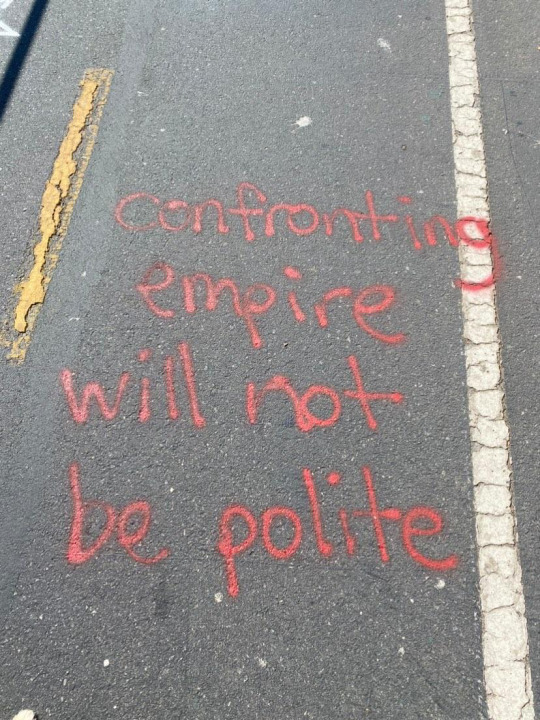
#glenda’s guidance#tarotblr#tarot reading#pick a card#divination#pick a picture#pick a pile#pac reading#pac tarot#inauguration#donald trump#activism#resistance#progressives#socialism#leftist#aries#taurus#gemini#cancer#leo#virgo#libra#scorpio#sagittarius#aquarius#capricorn#pisces#trans rights#inauguration day
45 notes
·
View notes
Photo
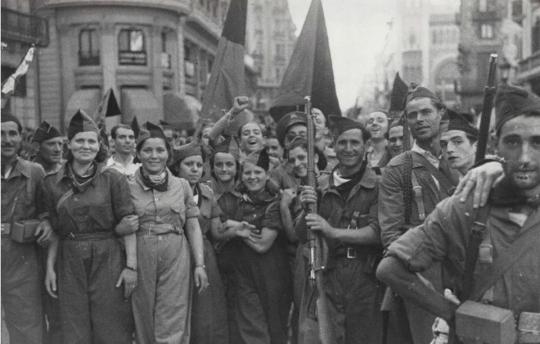
On this day, 19 July 1936, in response to a right-wing coup by general Francisco Franco, workers across Spain took up arms and launched one of the most far-reaching social revolutions in history. The ensuing civil war pitted the working class against the Spanish capitalists, who were backed by Nazi Germany and fascist Italy. In the revolutionary areas, anarchist and socialist workers and peasants took over workplaces and land and began to run them collectively. Thousands of mostly working class people came from all over the world to aid the workers of Spain. One of them was British socialist author George Orwell, who described the scene in Barcelona: "It was the first time that I had ever been in a town where the working class was in the saddle. Practically every building of any size had been seized by the workers and was draped with red flags or with the red and black flag of the Anarchists; every wall was scrawled with the hammer and sickle and with the initials of the revolutionary parties… Every shop and café had an inscription saying that it had been collectivised… Waiters and shop-walkers looked you in the face and treated you as an equal. Servile and even ceremonial forms of speech had temporarily disappeared. Nobody said ‘Señor’ or ‘Don’ or even ‘Usted’". Western democracies, including Britain and France, abandoned the republic and enforced a blockade on Spain which stopped the flow of aid and weapons to the anti-fascists. Meanwhile, Italy and Germany openly flouted the ban, and the US oil giant Texaco supplied the nationalists with oil and other supplies without even demanding payment while stopping any supplies to the republic. Ultimately, after nearly three years of bitter and bloody warfare, the nationalists with their superior weaponry and equipment, were victorious. Learn more in our podcast eps 39-40. We've also got books and more commemorating it, here: https://shop.workingclasshistory.com/collections/spanish-civil-war?sort_by=created-descending https://www.facebook.com/photo.php?fbid=664426942397191&set=a.602588028581083&type=3
388 notes
·
View notes
Text
flag is under the read more :)

i also made a version where i combined it with the 2017 philadelphia pride flag (black and brown stripes at the top) and another with the victory over aids black stripe at the bottom. both can be seen here.
#lgbt#pride#gay pride#trans pride#pride month#lmk in the tags if anyone wants me to update it again to connect it w the progress chevron!!!#though i may do it with just the trans pride colours and leave the philly black and brown stripes on top#polls#my polls#mine
512 notes
·
View notes
Text
Olga Lautman:
As infuriating and outrageous as Trump’s latest comments on annexing Gaza are, he is a master of distraction. He deliberately throws out incendiary statements, knowing they will dominate the headlines and divert attention from his dangerous actions at play—in this case, a power grab. I’m not saying Trump won’t invade Gaza—he very well might—but it won’t happen today. Right now, we need to stay focused on what is happening in real-time which is the dismantling of U.S. institutions, the seizure of sensitive government data—including our data, and the hostile takeover of federal agencies by Musk and his unelected, unvetted operatives. We must take Trump’s words seriously, but we cannot allow them to distract us from the authoritarian restructuring of our government that is unfolding before our eyes. Just as major news outlets finally began covering the hostile takeover of the U.S. federal government, questioning Trump and Musk’s actions to gut every agency and seize control over America’s most sensitive financial and intelligence systems, Trump dropped another bombshell comment to redirect the conversation—and instantly, the focus shifted. This is a classic authoritarian tactic and I have watched Russia use it for decades. Whether through false flags or controlled state media distractions, the Kremlin has long understood that if you control the conversation, you control public perception. While the world looks one way, they would consolidate power and tighten their grip behind the scenes. And right now, Trump and Musk are doing exactly that.
The Federal Government Is Being Dismantled at Blazing Speed
With Treasury payment systems, Medicare and Medicaid, intelligence agencies, and federal IT systems now under Musk’s control, the question isn’t just about political influence—it’s about them potentially preparing to loot the U.S. government and weaponizing the agencies against us. Every move suggests something far bigger is happening behind the scenes. In just over two weeks since Trump returned to power, we are already watching Project 2025 come to life. The FBI is being gutted, with at least 6,000 agents at risk as purges begin, crippling federal law enforcement and leaving the U.S. vulnerable to both foreign and domestic threats and attacks. Independent inspectors general have been purged, and USAID has been dismantled, eliminating one of America’s most effective tools for democracy-building and urgent humanitarian aid—a massive geopolitical victory for Russia and China, who will now fill the void immediately left by the U.S. as they celebrate. The Department of Education is set to be shut down, stripping away federal protections for students, gutting public education, and eliminating grant funding. Meanwhile, the CIA is now being purged, with ‘buyouts,’ which may potentially be illegal, offered to its entire workforce under the guise of “aligning with Trump’s priorities.” In reality, this is an effort to drive out national security experts who could resist an authoritarian takeover and a massive gift to Russia and every other adversary. At the same time, Musk has seized control of financial systems that handle trillions of dollars in payments. His unvetted operatives have gained access to the Treasury’s payment infrastructure, meaning they can freeze Social Security checks, federal tax refunds, military pensions, Medicare and Medicaid, and critical government funding at will. Career officials have been locked out of key systems, and government data is being copied and stored under Musk’s control, including Social Security numbers, tax filings, and classified federal records.
Russia’s Playbook: Diversion, False Flags, Crackdowns, and State Resource Theft
Russia is a master at using diversionary tactics to distract from major political shifts or internal power grabs. When the regime wants to tighten its grip, it throws out a narrative, and manufactures a crisis or scandal—either real or fabricated—to dominate the news cycle. When the government seeks to restructure power or push through major changes, it creates distractions. A foreign conflict, an internal crisis, or a manufactured national security “threat” floods the media, ensuring the public’s attention is diverted. Meanwhile, behind the scenes, major political and financial decisions reshape the country—as laws are rewritten or another crackdown is being prepared. All while, vast sums of state resources quietly vanish into the pockets of the Kremlin and its oligarchs. Sadly, we are now watching the same playbook unfold in the United States. Nearly every federal agency is under siege. This isn’t just about reshaping government or budget cuts—it’s about dismantling it from within. Law enforcement, intelligence, national security, and public institutions are being systematically hijacked and dismantled, leaving Americans more vulnerable at home and abroad as chaos spreads. And, it’s only the beginning and it will escalate.
Musk’s Control Over U.S. Systems Is the Real Emergency
While Trump dominates the news cycle with outrageous comments, Elon Musk is taking over the U.S. government from within. His unelected, team—including unvetted interns and former workers—now controls some of America’s most sensitive financial and national security systems. Musk’s team has gained access to the Treasury’s payment system, potentially giving them the power to stop Social Security checks, federal tax returns, and military pensions at will.
Olga Lautman explains that the Musk Coup of many federal agencies is the real crisis to our country.
23 notes
·
View notes
Photo

Timeline & Battles of King Philip's War
King Philip's War (1675-1678) was the pivotal engagement between the second generation of English immigrants who had arrived in New England and the Native American tribes of the region. The English won the war, and the natives lost not only their land but, in many cases, also their language and culture, at least for a time.
The policies of both sides were informed by earlier Anglo-Native conflicts including the Indian Massacre of 1622 which resulted in 347 English colonists killed by the tribes of the Powhatan Confederacy in Virginia, the later Third Powhatan War (1644-1646) which killed over 500 colonists in the same region, and the Pequot War (1636-1638) during which the Pequot tribe sought to enlist the Narragansett in the same sort of operation against the English.
The conflict was begun by Metacom (also known as King Philip and Metacomet, l. 1638-1676), chief of the Wampanoag Confederacy, in response to the policies of Plymouth governor Josiah Winslow (l. c. 1628-1680), which encouraged colonial expansion into Native American territory, and colonial usurpation of Native American rights concerning justice. Metacom's father, Massasoit (l. c. 1581-1661), had signed the Pilgrim-Wampanoag Peace Treaty with the first governor of Plymouth Colony, John Carver (l. 1584-1621), on 22 March 1621 which promised mutual aid and protection as well as the right of each party to punish their own for crimes. When the colonists hanged three high-level Wampanoags for murder in June of 1675, Metacom, tired of English lies, broken promises, and land theft, launched his first offensive.
The war devastated the region, destroying English and Native American settlements equally, costing thousands of lives, disrupting trade, and destroying crops. When the English finally could declare victory in 1678, the political, social, and demographic make-up of New England was completely changed. After Metacom was killed in 1676, the Native American initiative flagged and after 1678 those natives who had fought for Metacom's cause – as well as many who did not – were sold into slavery, deported, pushed onto reservations, or absorbed into other tribes. The war was hailed as a great victory for 'God’s People' against the 'heathen' but, actually, it was the inevitable result of English greed and Native American naivete and lack of unity.
Causes of the War
The causes of the war go back to the founding of Plymouth Colony in November 1620. The passengers of the Mayflower found the village of Pawtuxet abandoned - because the inhabitants had all died of European-borne diseases carried by traders c. 1610 - and settled there without ever compensating the tribes of the Wampanoag Confederacy who still used the land. This same model was observed with the establishment of Massachusetts Bay Colony in 1628 and again in 1630. Roger Williams (l. 1603-1683), an English theologian who lived at both Plymouth and Massachusetts Bay, criticized this policy c. 1633, noting that King James I of England had no right to claim foreign lands already inhabited and his subjects had even less right to settle those lands without compensating the owners fairly.
Williams was exiled from Massachusetts Bay Colony in 1636 for his religious views which differed from those of the magistrates, but his arguments concerning land rights of Native Americans certainly did nothing to endear him to the authorities. The colonists continued to take land from the natives, sometimes by way of what they saw as legitimate transactions and sometimes by outright theft. The natives did not fence in their territories because they did not believe they owned the land. In the same way, transactions of valuables for land were understood by the natives as gratuities for use of the land, not as a sale.
The immediate cause of the war was the death of the Wampanoag chief Wamsutta (l. c. 1634-1662) who was succeeded by his younger brother Metacom (King Philip), and the hanging of three Wampanoags, all high-level counselors to Metacom, by the colonists. Wamsutta had died shortly after returning from a meeting with Josiah Winslow at Plymouth, and Metacom claimed he had been poisoned. His claim was most likely true because Winslow had no regard for the natives and saw them as obstacles to progress that should be removed. Even though Metacom did not move against the colonists at this time, Wamsutta's death seems to mark a cooling of relations between the natives and the English.
Between Wamsutta's death in 1662 and the outbreak of hostilities in 1675, the colonists took more land in breach of the Pilgrim-Wampanoag Peace Treaty of 1621. The colonists had been welcomed to the land they had already claimed by the coast, but, increasingly, they were settling further and further inland. Metacom had repeatedly tried to negotiate with both Plymouth and Massachusetts Bay to stop expansion, but the English promises were never kept as they would have hampered profitable land deals made by men like Winslow.
Metacom began discussing an attack on the colonies with chiefs of his tributary tribes and others and news of this was brought to the colonists by one John Sossamon who overheard the talks. Sossamon was a former counselor and interpreter of Metacom's who had left to live with the English. He was a so-called 'praying Indian' – one who had converted to Christianity, learned English, and adopted English culture and dress. The praying Indian often served as interpreter in land deals and negotiations and so passed relatively freely between native and English villages. Sossamon’s report resulted in a call from the colonists for Metacom to explain himself - which he did, denying the truth of Sossamon’s account - but only after Sossamon was found dead.
Two months later, although many people had been interrogated and none had any information on the murder, eyewitnesses were suddenly produced by Winslow, and three Wampanoags were charged with Sossamon's murder. On 8 June 1675, these men were hanged by the English in direct breach of the 1621 treaty which made clear that each party would be responsible for punishing their own. Three days after the hanging, the Wampanoags were arming themselves outside Swansea Colony, and the first attack was launched against Swansea on 24 June 1675, starting the war.
Continue reading...
17 notes
·
View notes
Text

A Sudanese Armed Forces (SAF) attack on a busy market in western Darfur on Monday resulted in a "horrific massacre", a war monitor said on Wednesday.
The military's shelling of the Tur'rah market, located 80km north of el-Fasher, left hundreds dead, according to Emergency Lawyers, a group of lawyers who monitor the war in Sudan. While an official death toll has yet to be confirmed, Sudanese aid groups reported that at least 54 people were killed in the attack.
Darfur Victims Support (DVS), a local group that supports victims of the conflict, cited eyewitnesses who reported that some 126 civilians were killed in the attack, with many bodies "burnt beyond recognition".
The group noted that the market serves as a commercial hub for the surrounding areas and that it would have been thronging with people at the time of the attack, at approximately 2pm.
DVS condemned the strike as "deliberate and systematic," reporting that approximately 10 barrel bombs were dropped on the market. It further cited one witness who said that white phosphorous was used in the attack. Images shared by the group appeared to show charred bodies scattered among the smouldering ruins of the market stalls.
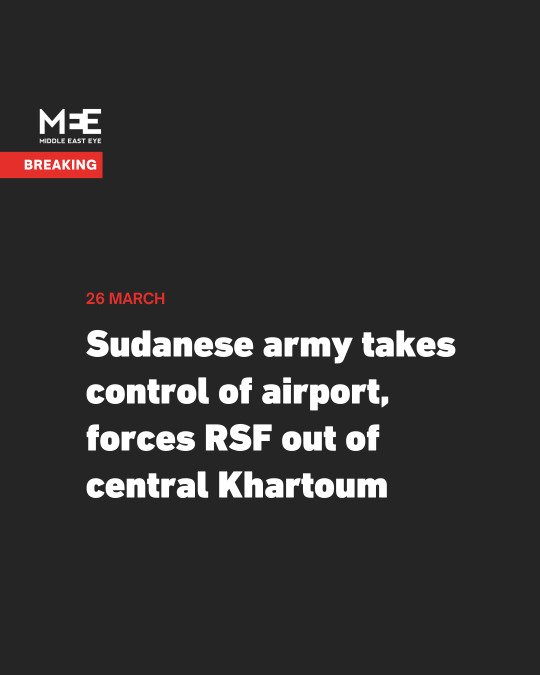
Sudanese Armed Forces (SAF) chief Abdel Fattah al-Burhan arrived by plane in Sudan’s capital Khartoum after his troops recaptured the airport on Wednesday from the Rapid Support Forces (RSF).
Reuters reported on Wednesday that RSF forces had mostly withdrawn from the capital, with the army deploying throughout several neighbourhoods, in what is one of the most significant developments of the two-year war between the army and the RSF.
Last Friday, Sudan’s army took full control of the country’s presidential palace in Khartoum, two years after it was seized by the paramilitary RSF. Today, Al Jazeera aired footage showing Burhan inside the presidential palace where he declared, “Khartoum is free”.
After closing in on the building on the Blue Nile in recent days, the army-aligned government announced its capture on Friday. “Today the flag is raised, the palace is back and the journey continues until victory is complete,” Khaled al-Aiser, Sudan’s information minister, wrote on X when the palace was captured.
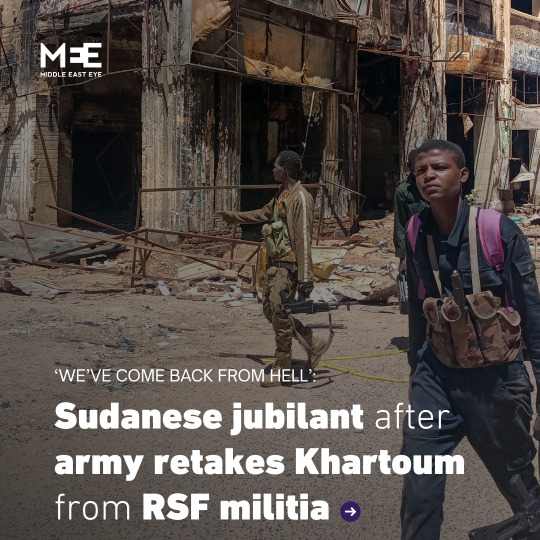

The streets of Khartoum erupted in celebration on Tuesday after the Sudanese Armed Forces (SAF) declared the city free from the Rapid Support Forces (RSF) militia.
Following intense street battles, the SAF officially announced its control over Khartoum, sparking jubilant scenes among those who remained in the city. Mohamed Obaid, 40, from Nile East - a former RSF stronghold - described the terror of survival under occupation. “I stayed indoors for days without food, too afraid to step outside,” he recounted to Middle East Eye. “I don’t even want to remember those days.
You could die at any moment for no reason. “If you managed to reach a Starlink shop to exchange money, you’d find RSF fighters running the place, seizing 30 percent of your cash for no reason.
They controlled all supplies and sold them at outrageous prices.” Emad Hassan, who fled to Cairo when the conflict erupted, told MEE: “I never thought I’d use this key again,” waving the key to his long-abandoned home in Khartoum. Hassan compared his experience to that of Palestinian refugees, forced from their homes but never giving up the hope of return.
“They still carry the keys to their houses wherever they go. We Sudanese love our land. We will return. The RSF expelled us in the most humiliating way, but we will come back.”
Despite the jubilant scenes, for many displaced Sudanese, the situation remains too volatile to risk returning home.
Once a symbol of beauty at the confluence of the White and Blue Nile, the capital now bears the scars of war - widespread destruction, streets littered with debris, and homes filled with tragic stories.
Dead bodies of civilians and soldiers alike serve as grim reminders of the suffering endured.
✍️ MEE / Mohammed Amin
17 notes
·
View notes
Text
The collapse of the Afghan state amid the United States’ withdrawal in 2021 gifted the new Taliban government with more than $7 billion worth of U.S. military equipment. Afghanistan’s new overlords suddenly found themselves with fleets of Humvees, mountains of machine guns, and forests of radars and satellite dishes. The vast hardware hoard also included dozens of aircraft: a motley mix of Hind and Blackhawk helicopters, cargo planes, and close air support props.
Before the Taliban even had time to inventory their new arsenal, Egyptian filmmaker Ibrahim Nash’at arrived in Kabul. From his home in Berlin, he had seen the scenes of civilians storming Kabul’s international airport in a desperate attempt to flee, and he had managed to obtain permission to come to Afghanistan and film. But his plan—to record the suffering of ordinary Afghans—was swiftly dashed. Accompanied by a Taliban minder at all times and forbidden to film anyone other than a Taliban commander and his men, Nash’at was forced to switch tack. That commander happened to be Mawlawi Mansour, the Taliban fighter in charge of creating a new Taliban air force from the equipment and pilots who were left behind.
Under orders from Mansour, Nash’at became the unexpected chronicler of a high-profile facet of Afghanistan’s regime change. The result is Hollywoodgate, a 90-minute documentary named after the sprawling U.S. base in Kabul, where the Taliban created their new air force after U.S. forces fled. In a total of seven months in the new Afghanistan and assisted only by a lone translator, Nash’at shot 220 hours of footage, later culled down with a team of five producers and nine Afghan translators. Overcoming his subjects’ extreme suspicion, Nash’at managed eventually to blend into Taliban meetings, inspections, and military missions, becoming so invisible that his subjects forgot about his camera and relaxed.
Mansour takes command of the former U.S. air base and immediately sets to work. He inspects his new force and is impressed by the scale of U.S. resources. But he is appalled by their Spartan aesthetics; “plant some trees here” is a constant command to scurrying subordinates as Mansour strides across the base. Taliban conversations show a sudden inversion: Off-screen holdouts against the new regime are “the insurgents” opposed by “our special forces.”
For Mansour’s men, the order of the day is repairing aircraft, many of which were purposely disabled by departing U.S. forces. After a perfunctory grilling, a handful of pilots from the old Afghan air force are welcomed into the new force. (Many others had fled with their aircraft to neighboring countries.) Training new Taliban pilots will take time, but Mansour gets a course up and running, his lecturers aided by a cardboard mock-up of a cockpit.
Women are immediately pushed to the margins of the new Afghanistan. With a whiff of amusement at their past effrontery, Mansour dictates that women in his ministry may return to work, but only if they are veiled. His own wife, he brags to his staff, is a doctor, but he restricted her to the home upon marriage.
The mood among Mansour’s future Taliban airmen is upbeat. We see low-ranking fighters exulting in their victory over the Americans and “the Jews.” An ambitious lieutenant is showered in confetti to celebrate his acceptance into the new air force academy. A gleeful door guard flags every comrade passing him in the hall with his U.S.-made M-4 rifle—the cocktail of frivolity and danger that characterizes many an insurgency or militia in the poorest parts of the world.
At times, the new overlords can verge on endearing. Mansour and his men visit the base’s well-appointed gym, where one Talib struggles to press a pair of dumbbells above his head. The boss steps on a treadmill and happily plods along, ordering one sent to his home “to make my belly smaller.”
I witnessed a very similar scene when I was deployed to Afghanistan as a U.S. Marine more than a decade ago. When we handed over a coalition patrol base to one of the Afghan government’s paramilitary forces, the incoming commander breezed by the fortifications, operations center, and mess hall. But a derelict elliptical trainer in our sandy outdoor gym fascinated him. He hopped aboard with a big grin and churned away, to the bemusement of the handful of watching Marines.
Outside the tight circle in which he was permitted to film, Nash’at was far less welcome, he told me in an interview this summer. In his wordless brushes with Afghan civilians, he felt indicted by their stares. He was convinced that they saw him as an Arab propagandist—a voyeur who had come to Afghanistan to see and celebrate the Taliban’s triumph.
Despite the restrictions placed on him as an outsider, Nash’at managed to get glimpses of ordinary Afghan life. Children occasionally appear onscreen, and we get a sense of the extent to which they have been formed and traumatized by a lifetime of war. Hanging on a tow ring of a hulking mine-resistant vehicle, one boy in a camouflage shalwar kameez mumbles that he will “take a weapon and kill you all.”
After months of maintenance, training, and reorganization, Mansour gets his triumph. Toward the end of Nash’at’s filming, the Taliban stage a military parade for their own men and a handful of Russian, Chinese, and Iranian dignitaries. After a show of marching infantry, armored vehicles, and a battalion intended for suicide bombing on motorcycles, Hinds and Blackhawks fly past the grandstand. It’s a successful first operation for the Taliban’s new air force, even if the fly-by is bit too fast for Mansour’s liking.
In the film’s final scene, Mansour is seen on his cell phone berating an official at the Tajikistan Defense Ministry for harboring the Taliban’s enemies. Nash’at told me he believes that many Taliban have aims beyond Afghanistan’s borders. One high-ranking leader told him, “I can’t wait until we conquer Egypt.” The Taliban believe they and their forebears have turned Afghanistan into the graveyard of empires, defeating the British Empire, the Soviet Union, and now the United States. One fighter exults that “with American weapons we will rule the world!”
Whatever their intentions, the film also leaves viewers skeptical of the Taliban’s ability to wield meaningful military power. Like many journalists since then, Nash’at immediately picked up on the boredom among the Taliban fighters that followed on the heels of military victory. While negotiating Kabul’s traffic in a sedan just weeks after the city’s fall, one of Mansour’s lieutenants tells the filmmaker that he already longs for war: the return of the Americans, 500 bullets, and martyrdom. Late in the film, an enthusiastic crowd of Taliban tries to pile into an aircraft for a VIP test flight and are beaten off with curses by Mansour’s men. Afghanistan’s new rulers are likely to have their hands full just keeping discipline among their own former fighters.
Nash’at likened the realities of governing after fighting to coming down from a narcotic high. Building a bureaucracy seems much harder work than winning a war. Staff meetings and wrangling over budgets are a poor substitute for ambushes and assaults. Early in the film, one Talib waxes nostalgic for the life of an insurgent, showing Nash’at the cave he and a few other men took refuge in.
Despite his fear and disgust of the Taliban, Nash’at believes that the West should engage them. He said that if they are ignored, they will act out for the world’s attention, to the detriment of their own people and the region. But he harbors no illusions that such engagement will yield swift changes in the character of the Taliban.
With Hollywoodgate, now streaming after a limited theatrical release, Nash’at may not have made the film he originally set out to make. The suffering of the Afghan people was walled off from him. The Taliban’s strictures confined him to a narrow lane and, as he notes in an introductory voice-over, to the story they wanted to tell the world. But if the Taliban thought that they had put Nash’at on a short enough leash to force him to produce a piece of propaganda for the new regime, they were mistaken, too.
After Mansour’s air show, Taliban secret police demanded that Nash’at come to their office and show them all of his footage. As he told IndieWire in an interview, he knew then that his work was done: “I was filming the transformation of a militia into a military regime, and I realized at that moment the transformation was complete.” Through empathy, patience, and not a little audacity, Nash’at succeeded in capturing a story of Afghan nation-building—but a far different one than almost any Westerner could have imagined 20 years before.
11 notes
·
View notes
Text
The conservative US supreme court justice Samuel Alito spoke to Donald Trump hours before the president-elect’s lawyers asked the court to delay Friday’s sentencing hearing in his felony conviction for falsifying business records. The pair talked on the phone to discuss the credentials of one of Alito’s former law clerks, who has been recommended for a job in Trump’s incoming administration. “William Levi, one of my former law clerks, asked me to take a call from president-elect Trump regarding his qualifications to serve in a government position,” Alito told ABC News, which broke the story. “I agreed to discuss this matter with president-elect Trump, and he called me yesterday [Wednesday] afternoon.”
Alito said they did not discuss the sentencing application or any other past or pending matter coming before the court that might involve Trump. But advocacy groups said the conversation revived ongoing ethics concerns surrounding several court justices, including Alito himself. Routine job references for a prospective administration officials are usually dealt with by lower-level aides, rather than the president himself.
“The call was merely an excuse for Trump to speak with one of the nine people determining the fate of his hush money sentencing in the coming days and who will review many more Trump-related issues over the next four years,” Gabe Roth, executive director of Fix the Court, an advocacy group, told the New York Times. “Typically, Trump and Alito are better at hiding their ethics issues, at least for a few months or sometimes longer. But with the supreme court green lighting near-absolute presidential immunity last year, and with Congress refusing to pass enforceable ethics for the justices, it appears there’s no reason to even try.” Trump’s lawyers have asked the court to delay a sentencing hearing scheduled for Friday – 10 days before his inauguration – at a court in New York over Trump’s 34 felony convictions for falsifying documents in relation to hush money paid to the adult actor Stormy Daniels shortly before his 2016 election victory. The conviction could carry a four-year jail sentence, although the judge, Juan Merchan, has indicated that he is likely to give Trump an unconditional discharge – in effect confirming his status as a convicted felon – in view of his presidential transition efforts and last July’s supreme court ruling granting him broad immunity for acts carried out in his role as president. Alito previously faced calls, which he rejected, to recuse himself from cases involving Trump, over the January 6 attack on the US Capitol and his attempts to overturn the 2020 election. The demands followed disclosures that a US flag was flown upside down – a symbol used by pro-Trump protesters in the January 6 breach – at Alito’s Virginia home, while a so-called “Appeal to Heaven” flag, also used by Trump supporters, was displayed at his holiday home in New Jersey.
9 notes
·
View notes
Text
i found another great anecdote in the memoirs of Marcellin Marbot... Marbot recounts a story where he presented Napoleon with some captured flags from a victory over the Austrians, and then a few days later helped Napoleon put on a little play to scare the ambassador of Prussia
"Marshal of the Palace Duroc, after telling us what we were to do, had all the Austrian flags which we had brought from Bregenz secretly replaced in the lodgings which Massy and I occupied; then, some hours later, when the Emperor was in conversation with Count Haugwitz in his study, we re-enacted the ceremony of the handover of the flags in exactly the same way as it had been done on the first occasion. The Emperor hearing the band playing in the courtyard, feigned astonishment, and went to the windows followed by the ambassador. Seeing the flags carried by the N.C.O.s. he called for the duty aide-de-camp and asked him what was going on. The aide-de-camp having told him that we were two of Marshal Augereau's aides who had come to hand over to him the flags of Jellachich's Austrian corps captured at Bregenz, we were led inside; there Napoleon, without blinking an eyelid, and as if he had never seen us before, took the letter from Augereau, which had been re-sealed, and read it, although he had been aware of its contents for four days. Then he questioned us, making us go into the smallest details. Duroc had warned us to speak out loudly, as the ambassador was a little hard of hearing, this advice was of no use to Major Massy, who was the leader of the mission, since he was suffering from a cold and had almost completely lost his voice, so it was I who replied to the Emperor, and taking a lead from him, I painted in the most vivid colours the defeat of the Austrians, their despondency, and the enthusiasm of the French. Then, presenting the trophies one after the other, I named the Austrian regiments to which they had once belonged. I laid particular stress on two of them, because I knew that their capture would have a powerful effect on the ambassador, "Here," I said "is the flag of the infantry regiment of his Majesty the Emperor of Austria, and there is the standard of the Uhlans, commanded by the Archduke Charles, his brother." Napoleon's eyes twinkled, and he seemed to say, "Well done young man!" At last he dismissed us, and as we left we heard him say to the ambassador, "You see, monsieur le Comte, my armies are everywhere triumphant…. The Austrian army is no more, and soon the same fate will befall the Russians." Count Haugwitz seemed deeply impressed, and Duroc said to us, after we had left the room, "The count will write tonight to Berlin, to tell his government of the destruction of Jellachich's force, which will put a damper on the war party, and give the king new reasons for holding off. Which is what the Emperor very much wants."
This comedy having been played out, The Emperor, to be rid of a dangerous onlooker who could give an account of the disposition of his forces, suggested to Count Haugwitz that it was not very safe for him to remain between two armies which were about to come to blows, and persuaded him to go to Vienna to M. Tallyrand, his minister for foreign affairs, which he did that same evening.
The following day the Emperor said nothing to us about the scene which had been enacted the previous evening, but wishing, no doubt, to give some sign of his satisfaction with the manner in which we had played our parts, he asked Major Massy, kindly, about the progress of his cold, and he pinched my ear, which with him was a sort of caress."
#PINCHED MY EAR...... how rude. someone should exile that man forever or something#imagine this in a movie#amazing
13 notes
·
View notes
Text
Tower of Dawn Chapter 59:
🚨spoiler alert🚨
A naval battle. Aelin against Maeve. He waited for the dangling sword to drop. If he had been too late--
Aelin--thank the gods Aelin had managed to find a way-- "Though there were some interesting details." Then the princess rattled off the facts. The numbers. A third of Maeve's armada, bearing Whitethorn flags, had turned on their own and joined Terrasen's fleet. Dorian had fought--held the front lines with Rowan. Then a pack of wyverns had soared in from nowhere--to fight for Aelin.
Manon Blackbeak. Chaol would be willing to bet his life that some-how, either through Aelin or Dorian, that witch had done them a favor, and possibly altered the course of this war.
"The magic, they say, was impressive," Hasar went on. "Ice and wind and water." Dorian and Rowan. "Even rumor of a shape-shifter." Lysandra. "But no darkness. Or whatever Maeve fights with. And no flame."
"Though some reports claim they spotted flame and shadow on shore--far away. Flickers of both. There and gone. And no one spotted Aelin or the Dark Queen in the fleet."
It would have been like Aelin, to shift the battle between her and Maeve to the shore. To minimize casualties, so she could unleash her full power without hesitation.
"As I said," Hasar continued, fluffing the skirts of her dress, "They were victorious. Aelin was spotted returning to her armada hours later. They've set sail--north, apparently."
He muttered a prayer of thanks to Mala. And a prayer of thanks to whatever god watched over Dorian, too. "Any major casualties?"
"To their men, yes, but not to any of the interesting players," Hasar said, and Chaol hated her. "But Maeve ... there and gone, not a whisper of her left." She frowned at the windows. "Maybe she'll sail here to lick her wounds."
Chaol prayed that wouldn't be the case. Yet if Maeve's armada still sat in the Narrow Sea when they took the crossing ... "But the others sail north now--to where?" Where can I find my king, my brother?
"I'd assume Terrasen, now that Aelin has her armada. Oh, and another one."
Hasar smiled at him. Waiting for the question--the plea. "What other armada," Chaol forced himself to ask. Hasar shrugged, walking from the room. "Turns out, Aelin called in a debt. To the Silent Assassins of the Red Desert." Chaol's eyes burned.
"And to Wendlyn."
His hands began shaking.
"How many ships," he breathed.
"All of them," Hasar said, hand on the door. "All of Wendlyn's armada came, commanded by Crown Prince Galan himself."
Aelin... Chaol's blood sparked, and he looked to Yrene. Her eyes were wide, bright. Bright with hope--burning, precious hope.
"Turns out," Hasar mused, as if it were a passing thought, "there are quite a few people who think highly of her. And who believe in what she's selling."
"Which is what?" Yrene whispered.
Hasar shrugged. "I assume it's what she tried to sell to me, when she wrote me a message weeks ago, asking for my aid. From one princess to another."
Chaol took a shuddering breath. "What did Aelin promise you?"
Hasar smiled to herself.
"A better world."
#Chapter 59#Tower of Dawn#Empire of Storms#can’t wait for the tandem read#TOG series spoilers#ToD spoilers#sorta EoS spoilers/confusion#SJM#TOG series#Sarah J. Maas#EoS#ToD#read with me#first read#catch up with me#read along#the fact it isn’t true crying over EoS/KoA#Aelin Galathynius#our queen#Chaol Westfall#Yrene Towers#Maeve#the battle#the plan#Hasar#Manon Blackbeak#Rowan Whitethorn#Dorian Havilliard#my brother😭#a better world
8 notes
·
View notes
Text
LGBTQ art

Bisexual fact:
Overall, 4% of U.S. adults say they identify as bisexual, according to an August 2023 survey by the Center. Younger adults are more likely than older Americans to describe themselves as bisexual. the term bisexual was used in Dutch for the first time in 1877, to refer to a hermaphrodite who had their sexual career as both a heterosexual woman and a heterosexual man. Later, the term bisexuality is used to represent both the double sexual-object choice and androgyny.

Aromantic fact:
Aromantic people can also form non-romantic relationships of all types, as well as being able to enjoy sexual relationships. They may also choose to have children, and studies indicate that aromantic individuals are no less likely to have children than alloromantic individuals. One of the earliest uses of the modern term "aromantic" dates back to 2005. The early online community around aromanticism formed on the Asexual Visibility and Education Network (AVEN), an online community around asexuality, and social media platforms such as tumblr.

Progress fact:
a reinterpretation of multiple iterations of the pride flag. The original 'rainbow flag' was created by Gilbert Baker in 1978 to celebrate members of the gay and lesbian political movement. It comprised eight coloured stripes stacked on top of each other to evoke a rainbow, a symbol of hope. Daniel Quasar (xe/xyr pronouns) is the creator of the Progress Pride flag, a combination of the original Pride flag by Gilbert Baker, the Trans Pride flag by Monica Helms in 1999, the More Color, More Pride flag introduced by Amber Hikes in 2017, and a black stripe from the Victory Over AIDS flag, inspired by Sergeant Leonard Matlovich, to represent those lost during the AIDS crisis. This flag design “forces the viewer to confront

Aro/ace fact:
Aromantic asexual people are colloquially known as "aro-ace" or "aroace". Aromantic individuals are also able to experience platonic love and may have committed friendships, and some form intimate non-romantic partnerships called "queerplatonic relationships". the early 2000s as a way for individuals to explore and understand their experiences of limited or absent sexual and romantic attractions.

Agender fact:
agender" was actually on the Internet! It was born in the year 2000, on an Internet forum called UseNet. In a chat room discussion entitled alt. messianic, a user posted the following: “God is amorphous, agender, so image can't be a physical or gender or sexual thing.” Agender is a term used by individuals who do not identify with any specific gender or who experience a lack of gender altogether. Agender people have a sense that their gender identity is completely neutral, or does not exist at all. They may use words like "genderless" and "gender free" to describe themselves.

Trigender fact:
In Ancient Greece, Phrygia, and the Roman Republic and Empire, Cybele and Attis were worshiped by galli priests (documented from around 200 BCE to around 300 CE) who wore feminine clothes, referred to themselves as women, and often castrated themselves, and have therefore been seen as early transgender figures. The exact origin of the term "trigender" is unknown, but it has been mentioned as early as 1998. The prefix tri- means three, so "trigender" literally means "three gender".

Gay fact:
2400 BCE, are speculated to have been gay based on a representation of them embracing nose-to-nose in their shared tomb, though critics say that they were likely brothers. In 1978 Harvey Milk became the first openly gay man elected to public office in the United States, and the first openly gay or lesbian person to be elected to public office in California, when he won a seat on the San Francisco Board of Supervisors. "The green (Community) and teal (Joy) in the flag represent Nature. I thought this was important because love between men is often seen as “unnatural” in the eyes of society and in religion. Furthermore, gay men have historically used green flowers and plants (Carnations, hyacinths, etc.) to symbolize our love, reinforcing our connection with Nature. The white stripe is adopted from the Trans Pride flag because trans, nb, and GNC men are often erased or talked over and need explicit representation.

Pansexual fact:
the hybrid words pansexual and pansexualism were first attested in 1914 (spelled pan-sexualism), coined by opponents of Sigmund Freud to denote the idea "that the sex instinct plays the primary part in all human activity, mental and physical". created to differentiate between the bisexuality flag, which also has three horizontal bars. It was created on the internet sometime around 2010, and has gained popularity since then. The Pansexual symbol combines the male, female, and transgender symbols into one, new, P-shaped symbol representing pansexuality.

Demigirl fact:
The earliest demigirl flag was created on April 15th, 2014 by Tumblr user kyriefortune. The second demigirl flag was created on August 24th, 2015 by pride-flags based on Willow's demiguy flag. Another flag was posted on the same day by pride-flags also based on Willow's demiguy flag. A gender identity term for someone who was assigned female at birth but does not fully identify with being a woman, socially or mentally. transgender pride-flag, retaining the central white & pink stripes representing enbies & women, but with 4 added horizontal stripes of different shades of grey to signify a disconnect and/or uncertainty associated with this gender-identity.
Hope you all had a great pride month. Can’t wait to do more of them.
What pride art should I do next year?
#my art style#my ocs#furry oc#lgbtq#husky#Rock n Pain#pipper#shinx#pokémon#progress pride flag#aroace#agender#trigender#gay#Ohsiren#pansexual#Ashie#sheba#demigirl#jenna brooklyn#snow leopard#snow tiger#siren#eel demon#gaur#spring hare#gundi#wolfwalkers#Red#red wolf
11 notes
·
View notes